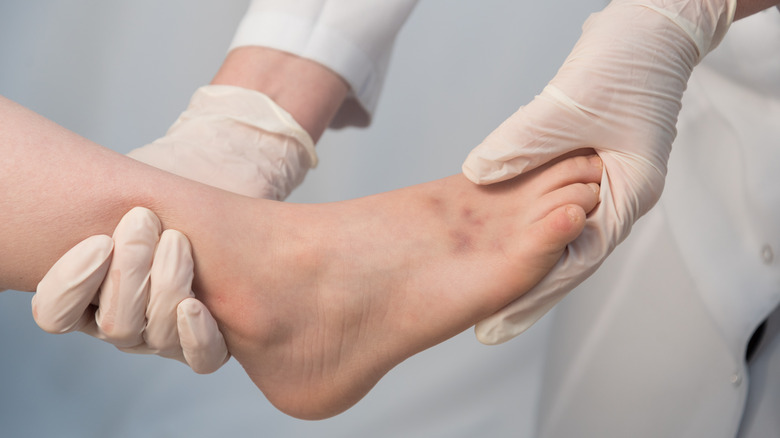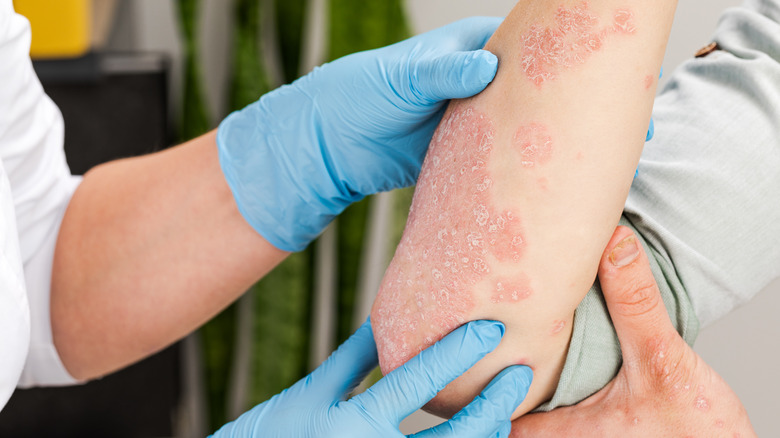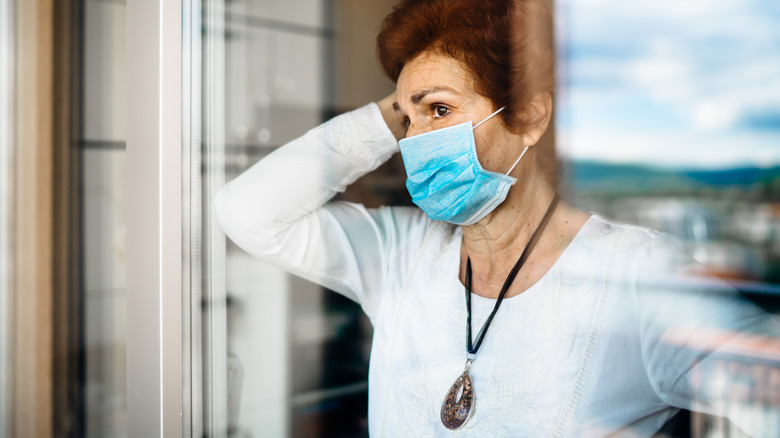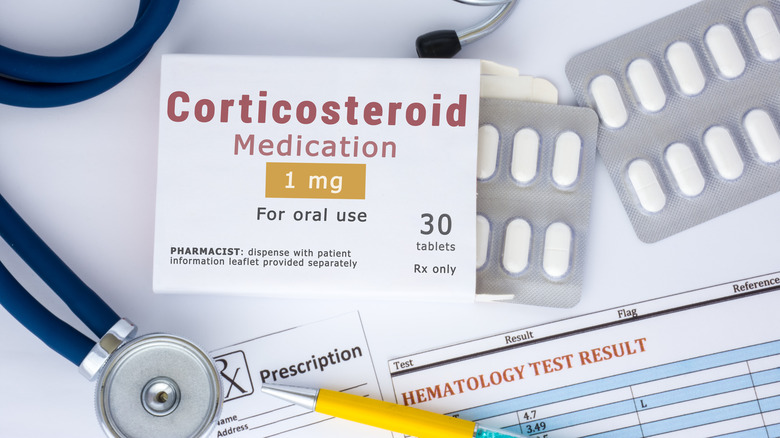Everything You Need To Know About Your Immune System
The immune system is the body's defense against infection. According to Johns Hopkins Medicine, we encounter bacteria, fungi, parasites, and toxins that try to make their way into our bodies every day. The immune system is responsible for preventing these harmful things from getting in. If a bacteria, fungus, parasite, or toxin makes it past the immune system's frontline defenses and infects healthy cells, the immune system is responsible for eradicating the infection, per the National Institute of Allergy and Infectious Diseases (NIAID).
A properly functioning immune system knows how to distinguish between healthy cells and unhealthy cells. When the immune system detects unhealthy cells, as a result of an infection or cellular degradation, it sends specialized cells to attack the infection.
The immune system is an extremely complex network of cells and organs that all work together to prevent and eradicate infection. When all these parts are working together and the immune system is functioning properly, very few outside invaders make it into the body. When these invaders do make it in, the immune system can easily respond and wipe out the infection. However, if the immune system isn't functioning properly, infections happen often and last a long time.
Parts of the immune system
Per the Cleveland Clinic, the immune system is composed of proteins, chemicals, organs, and white blood cells. The skin and the mucous membranes, which are found in your digestive, respiratory, urinary, and reproductive systems, serve as the immune system's first defense against bacteria, fungi, parasites, or toxins. The skin produces specific oils and cells that eradicate infectious materials before they can find a way in. The mucous membranes produce mucus, which traps the foreign invaders as they try to enter the body. Then, the cilia — hair-like structures located throughout the body — move the invaders out of the body before they can infect healthy cells.
If pathogens make it past the skin and the mucous membranes, several other systems kick in to eradicate them before they cause infection. The tonsils, located in your throat, and the adenoids, located in the throat behind the nose, work together to catch invaders. They then secrete chemicals that kill them.
The stomach and the digestive tract work similarly. When pathogens make it to the stomach or bowel, they produce chemicals to kill them. The gut is also full of good bacteria that fight bad bacteria.
Your bone marrow, thymus, spleen, and lymph nodes all produce and store specialized white blood cells, which are the core of the immune system. When invaders do make it into the body and infect healthy cells, an army of white blood cells from all over the body responds to attack the infection.
The innate and adaptive immune systems
We each have two types of immune systems — the innate immune system and the adaptive immune system (via the Institute for Quality and Efficiency in Health Care).
The innate immune system is responsible for prevention. It's made up of the skin, mucous membranes, proteins, and specialized immune system cells including phagocytes, leukocytes, and natural killer cells. When the skin or mucous membranes detect a foreign invader, nine different proteins are released. Some proteins mark the invaders for the leukocytes, which come and eat the invaders. Other proteins attack the invaders directly. Natural killer cells work a little differently. They're trained to detect and destroy unhealthy cells throughout the body.
The adaptive immune system is responsible for dealing with infections that make it through the innate immune system. It's composed of white blood cells called T lymphocytes, B lymphocytes, and antibodies.
The T-cells identify the infected cells, then call in other white blood cells to fight the infection. Some of the T-cells are responsible for destroying the infected cells, while others are responsible for "remembering" the infection. This "memory" helps the T-cells respond to the same pathogen in the future. B-cells produce antibodies, which are specialized proteins that attach to the invader to stop it from spreading. Once our bodies have produced antibodies for a specific invader, the B-cells remember how to make those antibodies. This is how our adaptive immune system learns to deal with specific infections and fight them in the future.
How your immune system responds to a virus or bacterial infection
When a virus or bacteria makes it past your innate immune system, it starts to invade healthy cells either degrading them or killing them, per the National Academy of Sciences. The pathogen then multiplies and tries to infiltrate as many cells as possible.
Once the T-cells identify damaged cells, they check their "memory" to see if this virus or bacteria has infected the body before (via NIAID). If the T-cells recognize the virus or bacteria, they call in the B-cells, which recognize the pathogen and produce the specific antibodies. Then the T-cells and B-cells replicate very quickly to address the infection. The T-cells get to work destroying the damaged cells and the B-cells continue to produce antibodies to stop the spread of the virus or bacteria.
If the T-cells don't recognize the virus, they call in the B-cells to create brand new antibodies for the invader. It takes a while for the B-cells to produce the new antibodies. So, while the B-cell works, the T-cells replicate to identify and destroy the damaged cells. Since there are no antibodies to slow down the pathogen, it's hard for the T-cells to keep up. This is why it takes our immune system longer to fight a new virus or bacteria than one we've encountered before.
Sometimes the body produces antibodies capable of stopping a virus or bacteria before it has a chance to replicate. That's why we only get diseases like chickenpox or the measles once, or never if we get vaccinated.
How your immune system responds to an injury
When you fall, bump into something, or get hit, platelets, the blood cells responsible for clotting, are the first to arrive on the scene, according to Harvard University. These blood cells group together to stop the internal or external bleeding. If the injury breaks the skin, the platelets will form a scab as a protective barrier to prevent pathogens from getting in. If the injury doesn't break the skin, the platelets start grouping together to stop the blood vessels from leaking, which forms a bruise.
Next, the platelets release chemicals that signal other immune cells to come to the site of the injury. This also causes the blood vessels surrounding the injury to widen so that more immune cells can reach the injured tissue. The extra fluid buildup from blood cells and immune cells flowing to the injury causes inflammation, which causes swelling at the site of the injury.
Inflammation brings more immune cells to the injury so they can start to repair the damaged cells. White blood cells called neutrophils destroy bacteria and other pathogens before they can enter the body. Other white blood cells called macrophages consume the damaged cells so they can be expelled from the body. After the macrophages have cleared out the damaged cells, they start to release proteins that help to build new cells, which repair the damaged tissue.
This process can take hours, days, weeks, or even months, depending on the extent of the injury.
How your immune system creates allergic reactions
Your immune system is also responsible for creating allergic reactions. According to the British Society for Immunology, allergies are a sign of an overactive immune system. They occur when your immune system decides to respond to a non-threatening substance — like dust, pollen, pet dander, or foods — the same way it would react to a pathogen.
There are two types of allergies: immunoglobulin E (IgE) mediated allergies and non-IgE mediated allergies. When a person with IgE mediated allergies first encounters the substance they're allergic to, called an allergen, their immune system calls in T-cells and B-cells to attack the allergen and form antibodies. The antibodies, called immunoglobulin E, bind to specialized white blood cells called mast cells, which are the immune system's first responders for allergic reactions. Whenever the allergen is encountered, IgE bound mast cells respond to the allergen, causing an allergic reaction. Since the immune system responded to the allergen as a threat and created antibodies during the first encounter, every subsequent time the person is exposed to that allergen, the immune system response will trigger.
Non-IgE mediated allergies are far less understood. However, experts know that the reactions are caused by an abnormal immune cell response, not an antibody response. In other words, the immune cells responsible for responding to allergens malfunction and create an allergic reaction.
The allergic reaction process is actually harmful to the body, creating cell damage, tissue damage, chronic inflammation, and sometimes even chronic disease.
What happens when your immune system is deficient?
There are two ways that your immune system can malfunction. According to the Children's Hospital of Philadelphia, a person's immune system can be overactive, causing allergies, or autoimmunity, or underactive, causing immunodeficiency.
When a person is immunodeficient, also called immunocompromised, their immune system can't respond to pathogens the way it should, per WebMD. So, it's easier for pathogens to get into the body, and once they're in, the immune system can't properly fight the infection. Immunocompromised people get sick a lot more often than those with healthy immune systems, and their illnesses are often worse and last longer.
Immunodeficiency can be genetic or the result of chronic diseases and medications. Primary immunodeficiency occurs when you're born with a weakened immune system. There are more than 40 different inherited conditions that can impact different parts of the immune system, causing immunodeficiency. Secondary immunodeficiency happens when another factor compromises your immune system. Diseases that often cause immunodeficiency include diabetes; human immunodeficiency virus (HIV); cancer, especially bone marrow cancer; Steven-Johnson syndrome; graft versus host disease; scalded skin syndrome; major burns; and malnutrition. Medications and treatments that can cause immunodeficiency include prednisone, methotrexate, stem cell transplant, chemotherapy, and radiation.
Symptoms of immunodeficiency include frequent illnesses and infections, illnesses that don't respond to typical treatments, unexplained fevers and chills, frequent respiratory infections, chronic diarrhea, and unexplained weight loss. People who struggle with these symptoms over a long period of time should talk to their doctor about immunodeficiency.
What happens if you have an overactive immune system?
When your immune system is overactive or hypersensitive, it responds to things that aren't a threat to the body. As previously discussed, this leads to allergies. An overactive or hypersensitive immune system can cause chronic disease as well.
New research into mast cells, the first responders to allergens, has found that mast cells are involved in several chronic illnesses, including multiple sclerosis, diabetes, rheumatoid arthritis, chronic hives, and vasculitis (via the medical journal Mediators of Inflammation). When the immune system is overactive, the mast cells inappropriately respond to harmless triggers by releasing histamine and calling in T-cells and B-cells to attack the trigger as if it were a pathogen. This kicks off the inflammation process. In people with overactive immune systems, the inflammation process is initiated so often that it causes chronic, systemic inflammation.
According to Harvard Health Publishing, chronic inflammation causes the immune cells to work constantly because they're trying to resolve the inflammation and repair damaged tissue. This causes them to attack healthy tissue as well as damaged tissue, which causes more inflammation, creating a harmful cycle. Chronic inflammation has been associated with chronic illnesses like arthritis, diabetes, heart disease, cancer, and bowel diseases like Crohn's disease and ulcerative colitis.
Systemic inflammation caused by an overactive immune system can be treated by lessening the immune system's response to harmless triggers. The method depends on the specific cause of the inappropriate immune system reaction. Usually treatment involves medications and lifestyle changes.
What are autoimmune diseases?
When someone has an autoimmune disease, their immune system produces antibodies that attack their body's healthy cells as if they were pathogens, because they can no longer differentiate between healthy and diseased cells, per WedMD.
Autoimmune diseases are classified by the system the antibodies choose to attack. Rheumatoid arthritis occurs when antibodies attack the joints. Multiple sclerosis happens when they attack the nervous system. Inflammatory bowel diseases like Crohn's and ulcerative colitis develop when the immune system attacks the bowel. In systemic lupus erythematosus, the immune system attacks tissue throughout the body, causing a host of systemic issues. Grave's disease and Hashimoto's thyroiditis both attack the thyroid, causing hyperthyroidism and hypothyroidism respectively.
Other autoimmune diseases include chronic inflammatory demyelinating polyneuropathy (CIPD), Guillain-Barre syndrome, type 1 diabetes, psoriasis, myasthenia gravis, and vasculitis.
According to the National Institutes of Health, the majority of autoimmune diseases cannot be cured. However, they can be managed with various treatments.
What causes immune system disorders?
According to Johns Hopkins Medicine, about 23.5 million people in America have immune system diseases. Experts still aren't sure why some people get autoimmune diseases, however, they have some well-researched theories.
Genetics are definitely a part of immune system diseases, but experts still haven't determined how they get passed on. Experts have noted connections between immune system diseases and infections as well. When the immune system responds to an infection, healthy cells often get damaged in the process. Experts posit that for unknown reasons, the damage to the healthy cells trains the immune system to attack healthy cells, leading to an immune disease. Another theory, which needs further research, is that cells damaged during an injury can lead to inflammation that kicks off an immune response. According to the Cleveland Clinic, there is also a correlation between immune system dysfunction and high levels of the stress hormone cortisol.
Most experts agree that there probably isn't a single cause for any immune system disorder. Instead, genetics, environment, and health events like injury and infection all combine to kick off immune system dysfunction.
Stress and the immune system
Research has found a clear link between stress and the immune system. According to the American Psychological Association, stress leads to a weakened immune system. So, you actually are more likely to get sick if you're feeling super-stressed.
The impact of stress on the immune system is even greater when we're under stress for extended periods of time (via the Cleveland Clinic). Chronic stress leads the body to produce more of the stress hormone cortisol. Over time, high cortisol levels can wreak havoc on the body. Healthy cells start to deteriorate, kicking the immune system into action. When the immune system remains active for long periods of time, it can lead to immune system dysfunction.
An article on stress and immune system function published in the Journal of Consulting and Clinical Psychology stated that studies have found a link between stress and increased systemic inflammation. Since chronic inflammation is thought to play a major role in immune system diseases, it follows that stress would impact immune system dysfunction.
The same article pointed out that people who experience chronic stress usually have poor daily health habits as well. They generally have trouble sleeping, managing their diet, and getting regular exercise. Some chronically stressed people abuse substances to manage stress. These poor health habits also contribute to immune system dysfunction.
So, stress management is essential to a functioning immune system. Adding yoga, deep breathing exercises, meditation, or other stress management techniques to your life can help.
When to see a doctor
According to WebMD, the symptoms of each immune system disease vary. However, there are some common symptoms that occur in most immune system diseases that you can look out for.
The primary symptom to watch for is feeling unwell a lot of the time. If you often experience pain not associated with an injury, catch every single cold and bug that goes around your social circle, and/or feel tired all the time, no matter how much sleep you get, it's time to see a doctor.
Significant changes in your bowels can also indicate an issue with your immune system. Diarrhea or constipation that lasts for more than a couple of weeks is usually a sign of a medical issue.
Frequent rashes or rashes that just won't go away are another common indicator of immune system dysfunction. The skin is the immune system's first line of defense. So, when the immune system is working overtime, perhaps even attacking healthy cells, skin rashes often appear, seemingly out of nowhere.
Other common symptoms include: perpetually cold hands, frequent and persistent headaches, frequent mild fevers, hair loss, sensitivity to sunlight, sudden weight loss or gain, numbness or tingling in your extremities, trouble swallowing, or changes in the color of your skin. If any combination of the above symptoms are present, especially for an extended period of time, make an appointment with your doctor.
Treatments for immune system diseases
The primary goals of treatment are to regulate immune system function and reduce systemic inflammation, per Healthline. The approach taken to achieve these goals is different for each immune system disorder and each person.
People with overactive immune systems and autoimmune diseases take drugs called immunosuppressants, which lessen the immune system's natural responses. According to the Mayo Clinic, immunodeficient people undergo treatments like immunoglobulin therapy, interferon-gamma therapy, and growth protein therapy to stimulate immune system function.
Many people take supplements to replenish hormones, proteins, vitamins, and minerals their body cannot properly produce because of their autoimmune disease.
To control inflammation, many people take over-the-counter non-steroidal anti-inflammatory drugs (NSAIDs) like Ibuprofen and naproxen. If those don't work, a doctor can prescribe other anti-inflammatory medications, according to the Cleveland Clinic.
Many people also find relief from their symptoms through alternative therapies like chiropractic adjustments, acupuncture, and herbal remedies. Lifestyle choices like dietary changes, regular exercise, and improving sleep may help as well.
Other treatments are tailored to the individual's symptoms. If they experience skin rashes, their doctor can prescribe topical creams. If their disease makes them deficient in a hormone, protein, vitamin, or mineral, they can take supplements or get infusions to correct the deficiency.
People with immune system diseases work closely with a medical team to develop a treatment plan that works for their condition and their body. Many people with autoimmune diseases are able to manage their symptoms and live relatively normal lives.
Can you boost your immune system?
There's a lot of information out there about ways that you can "boost your immune system," especially in the age of COVID-19. Some studies even suggest that COVID-19 can suppress the immune system and that people with autoimmune disorders are at higher risk for severe cases.
However, according to Harvard Health Publishing, boosting your immune system is a myth. The immune system is extremely complex, and there aren't any proven links between lifestyle choices and improved immune system function. Harvard Health also stressed that products for "boosting immunity" can be scams.
The article did state that improving daily health habits can help the immune system function properly. However, it also noted that research hasn't found a clear link between lifestyle changes and improved immunity. If you want to help your immune system be its best, Harvard Health Publishing recommends eating a balanced diet filled with fruits and veggies, exercising regularly, minimizing stress, getting enough sleep, quitting nicotine, limiting alcohol consumption, and staying up to date on your vaccinations.
Vaccines and the immune system
According to the World Health Organization, vaccines give our bodies the cheat code for defeating a brand new pathogen. They do this in two different ways — introducing the pathogen's antigen into the body or giving the immune system the information it needs to create antibodies for the new pathogen.
When a pathogen enters the body, it breaks down into parts called antigens. The B-cells that respond analyze the antigens to figure out how to make antibodies. As previously discussed, the B-cells then create a "memory" of the antigen so it can produce the right antibodies when it encounters the antigen again. When the B-cells don't have any "memory" of a new pathogen, it takes a while to make the right antibodies. While this process is happening, we get sick. When the antibodies are made and proliferate throughout our bodies, we start to get better.
Traditional vaccines inject an inactive or weakened antigen into the body. Not one strong enough to make most people sick, but strong enough to trigger the immune system to create antibodies. When we encounter the real pathogen for the first time, the body already has the right antibodies prepared, and it can start fighting the pathogen immediately.
Newer vaccines, like the mRNA COVID-19 vaccine, give the B-cells instructions for how to produce antibodies for specific pathogens. The body then produces the antibodies based on those instructions without ever encountering the pathogen.
Both types of vaccines severely reduce our chances of getting sick or severely ill.















